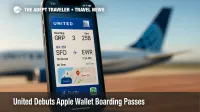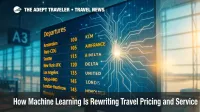Technology & Travel
The landscape of travel has been drastically transformed by the rapid development of technology in recent years. From the way we plan our trips to how we navigate in foreign places and even how we document our experiences, technology has changed every aspect of the journey. In this comprehensive look, we will delve into how technology has reshaped the travel industry.
The Planning Phase: Research and Booking
In the past, people planning a trip would have to pore over travel guides and maps, visit travel agencies, and make numerous phone calls to gather information and secure bookings. However, today's technology has simplified this process remarkably. Online booking sites have become a one-stop solution allowing travelers to compare airline prices, make hotel reservations, and even arrange for car services with a few clicks. In addition, user reviews and ratings on these platforms aid in reducing the uncertainty associated with trying new services or visiting unfamiliar places.
Moreover, technology has empowered travelers to become their own travel agents. Mobile applications like TripAdvisor, Kayak, and Expedia make it possible to research, plan, and book vacations right from the comfort of home. Similarly, Google Maps and GPS Navigation systems have made paper maps obsolete, reducing the fear of getting lost in a foreign land.
The Journey: Travel Technology at The Airport and Beyond
With the dawn of technology, even the journey to the destination has seen massive changes. Airlines have turned to technology to streamline their operations and enhance the travel experience. From self-service check-in counters and e-boarding passes on mobile phones to real-time luggage tracking and in-flight Wi-Fi service, technology is taking the hassle out of air travel. In fact, facial recognition systems are being tested in several airports, aiming to provide a seamless and more secure travel experience.
At the heart of this technological revolution in travel is the smartphone, which serves as a versatile tool on the road - a boarding pass, hotel key, payment method, translator, and more. There are numerous apps that aid in navigating unknown streets, translating foreign languages, and even recommending local attractions or eateries based on real-time location.
The Destination: Immersive Experiences and Digital Payments
At the destination itself, travelers find themselves benefiting from technology as well. Many hotels now enable guests to bypass the check-in counter altogether and access their rooms directly using digital keys on their smartphones. Others have integrated technology into their rooms for control of lighting, temperature, and entertainment with a simple voice command.
In terms of sightseeing, augmented reality (AR) and virtual reality (VR) technologies offer immersive experiences that enable travelers to virtually 'visit' sights and attractions, or gain more in-depth knowledge about a historic site by overlaying digital information onto the real world.
Additionally, digital payments have made traveling more convenient. With the likes of PayPal, Apple Pay, and various digital wallets, there's no need to convert large amounts of cash into foreign currencies. From buying attractions’ tickets of to paying for meals, digital payments have made transactions seamless and secure.
The Sharing: Social Media and Online Reviews
The rise of social media has not only changed the way we share our travel experiences, but it also influences where we decide to go. Instagram-worthy sights or hotels can lead to an upswing in bookings, while online reviews on platforms like TripAdvisor and Yelp exert significant sway over travelers' decisions.
Technology also allows immediate sharing of experiences, emotions, and impressions, contributing to a shared global understanding and empathy. Whether it's a stunning sunset photo on Instagram or a detailed hotel review on a blog, such content contributes priceless insights for others planning similar trips. This online ecosystem of information sharing among travelers has become an invaluable resource in travel planning.
The Future: AI, IoT, and Smart Travel
Artificial intelligence (AI) and the Internet of Things (IoT) are among the technologies poised to further shape the travel industry. AI can offer personalized trip recommendations based on individual preferences, while IoT-driven luggage tracking and smart hotel rooms offer more convenience for travelers. Meanwhile, drone technology and 360-degree video content are set to change the way we discover and document our travel experiences.
Technology has fundamentally redesigned the experience of travel, bringing unparalleled convenience and opening up horizons to individualized and exciting adventures. As advances continue, we can only imagine the possibilities that future travel technologies will unlock, offering a more seamless, secure, and unique travel experience for everyone.
United App and United.com Outage for SHARES Upgrade Feb 4

American Airlines App Update Adds Delay Rebooking Tools

American Connect Assist Expands at U.S. Hubs

Smart Baggage Tracking On Turkish Airlines Flights

Apple Delta Bag Tracking Upgrade With Apple Systems

Microsoft Azure Outage Disrupts Airline Systems

United debuts Apple Wallet boarding passes

JetBlue Unveils TrueBlue Travel Booking Platform

TSA Invites Private Tech to Reinvent Checkpoints

How Machine Learning Is Rewriting Travel Pricing and Service

How to Choose the Perfect Travel Pants for Comfort and Security

Essential Digital Security Practices for Safe Travel

